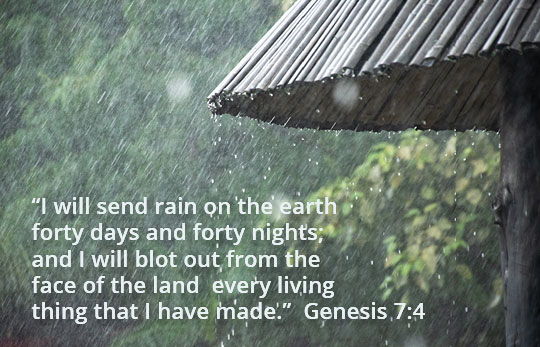Bible Question:
Did Noah know about rain before the flood in Genesis 7?
Bible Answer:
Some have claimed that since Noah did not ask God any questions about rain, that proves he knew about rain. That is, they believe Noah had seen it rain and watched rain fall from the sky. Therefore, this Q&A answers the question, “Did Noah know about rain before the flood in Genesis 7?” In the following discussion we will examine the meaning of the Hebrew word that is translated as rain and then we will consider a biblical principle of how to interpret the Bible.

Meaning of The Hebrew Word
First, we want to examine what the Hebrew word for “rain” means in the Old Testament. The Hebrew word for “rain” appears first in Genesis 2:5 when Scripture informs us that rain did not occur in the Garden of Eden. The next time the Hebrew word appears is in Genesis 7:4 when God tells Noah that He would send rain for forty days and forty nights upon the earth.
For after seven more days, I will send rain on the earth forty days and forty nights; and I will blot out from the face of the land every living thing that I have made.” Noah did according to all that the LORD had commanded him. Genesis 7:4-5 (NASB)
The Hebrew word that is translated as “rain” is matar. The Dictionary of Biblical Languages with Semantic Domains: Hebrew defines the word as “a natural weather condition where condensed water drops fall to the earth.”[1] The definition is revealing since it defines the word as water drops falling to the earth. This definition could be the simple explanation of what Noah understood God to say. God may have simply said water will fall from the sky. In the English language we understand that the noun “rain” refers to drops of water that fall. Therefore, Noah would have understood and he would not have had to ask.

Biblical Principle For Interpreting Scripture
The second important point to consider in determining if Noah already knew about rain, is to follow biblical principles of interpretation. The most important principle of interpretation that applies in this situation is “When Scripture is silent, we must be silent.” In the preceding section, we discovered that it is possible God simply told Noah that drops of water would fall from the sky. It is also possible that God created a new word that is called “rain.” It is also possible that Noah asked, “What is rain?” It is also possible that Noah did not ask about rain because he had already seen rain. But since Scripture does not tell us if Noah asked a question or did not ask a question, we do not know what Noah did or what he knew. Scripture is simply silent. The Bible does not give us any additional information about the conversation between God and Noah. Therefore, we do not have enough information to conclude that Noah had experienced rain.
Since Scripture does not record that rain occurred between Genesis 2 and Genesis 7, we do not know if rain occurred between Genesis 2 and Genesis 7! We only know that the book of Genesis refers to rain in Genesis 2 and then again in Genesis 7. We cannot assume that rain existed prior to Genesis 7 since Scripture is silent on the subject.
Conclusion:
What is recorded in the Bible is truthful and can be trusted as being true. We cannot conclude that Noah did not ask God a question about rain since no one is recorded as being a witness to the conversation. Since Scripture does not tell us that Noah knew about rain, we do not know if Noah knew about rain. Since Scripture does not tell us that Noah asked about rain, we do not know if Noah did know about rain. All that we know is that Scripture mentions rain in Genesis 2 and Genesis 7. “When Scripture is silent we must also be silent.”
References:
1. James Swanson, Dictionary of Biblical Languages with Semantic Domains : Hebrew (Old Testament). Oak Harbor: Logos Research Systems, Inc., 1997.
Suggested Links:
Was there rain before and after Noah’s flood in Genesis?What happened to the flood waters of Noah’s day?
What calendar was used in Genesis 7-8?
Was Jesus resurrected on the same day Noah’s ark rested on Mt. Ararat?
What is the meaning of the rainbow?